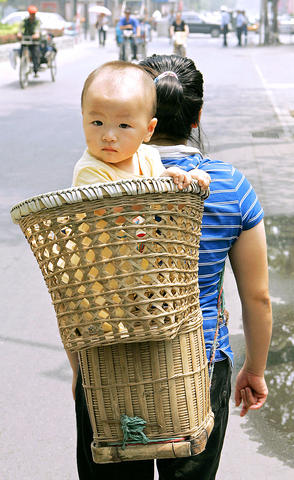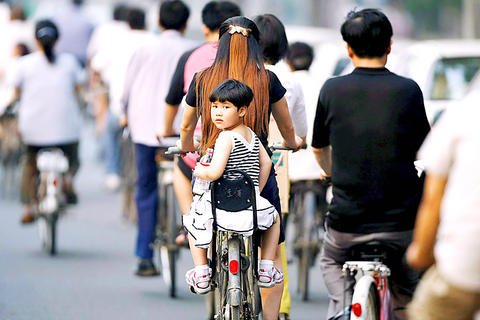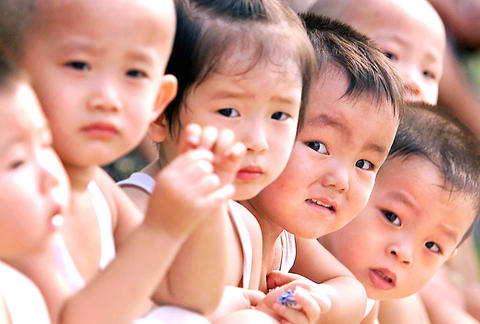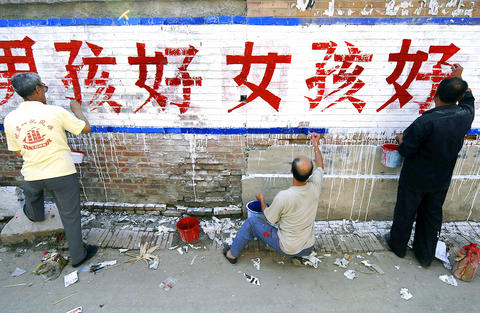In China, around 190 children are snatched every day - stolen from their beds and the streets. This is more than double the average number of abductions recorded in England and Wales over a whole year. If 190 people were dying every day from the same illness, you'd call it an epidemic. And that's exactly what it is, except nobody really wants to talk about it. Especially the Chinese government.
The government doesn't want to talk about it because it's a short step from fully acknowledging the kidnappings to having to address why they're happening. Which means entering dangerous territory - a root cause of such large numbers of children being snatched is the fact that having a son in China is a necessity. He carries the family name, he is the child who will provide for his parents as they age. The One Child Policy has resulted in prohibitive family-planning laws in China: prospective parents must have a birth permit before conceiving and urban families must pay a fine for flouting the one-child rule. If you haven't had an abortion to get rid of your female child (although it is now illegal), how can you be sure to get a son? Sometimes the only choice seems to be to buy a stolen child, gender already determined.
"I did think about suicide," says Li, a woman in her early twenties. "I missed my child so much." It has been a year and a half since her little boy, Chen Jie, was taken. He was five years old, playing at his grandmother's vegetable stall in Sichuan, when Zhang, a trusted neighbor, passed by. Offering to bring Chen Jie back to his mother, Zhang left, taking the child with him. This was the last time Chen Jie was seen by his family. Later, when parents and grandmother realized that neither had the little boy, they ran to Zhang's door, desperately hoping he was there. Calmly, Zhang said that, after giving him money for sweets, he'd left Chen Jie at the apartment block.

PHOTOS: EPA
"Sometimes I don't want to carry on my life," Li continued. She has come close to killing herself many times, she said, but is always stopped by the thought of how disappointed her family would be. Culturally, the responsibility for the family weighs heavily: Li and her husband, Lung, already feel they have let their parents down by depriving them of the grandson who would carry on the family name. Once, Li admits, she was ready to jump from the top of a public washroom, but the owner of the building dragged her home. "She tried to prevent me from thinking that way," Li says. "She knew a story in which a mother who lost her child killed herself by jumping off a building. After her death, the father sold the house and lost contact with everyone. Never came back. Later, their friend found the child and brought him home, but the whole family was gone." Li has thought about this tragic twist many times. "If you die, and your child comes back one day, he loses his mother forever."
Li and Lung Chen are determined to do anything to get their son back, but their options are severely limited. The media is too close to the government to be used as a tool, and even joining a parents' support group must be done in secret. They saved up US$80 to put Chen Jie's picture on a poker set that features missing children on every card; in their desperation, they're gambling on gamblers. Putting up missing posters of Chen Jie, his eyes staring out brightly even from a photocopy, was risky because it's forbidden (the authorities aren't keen to have reminders of missing children on show), but they did it. Hiring a private detective cost money, but they did that, because the detective has a reputation for successful rescue missions. Speaking to Westerners about their plight was downright dangerous, but they've done that, too.

PHOTO: AFP
International Attention
The production team behind the Emmy Award-winning documentary The Dying Rooms, which in 1995 uncovered the neglect of abandoned children in Chinese state-run orphanages, went back to China this year. The idea behind the first documentary was that China's One Child Policy, the population stabilizer, had led to the abandonment of girls - this, and their subsequent abuse in some cases, was recorded as tragic confirmation. More than 10 years later, the team - this time headed by debut director Jezza Neumann - went back to investigate another consequence of the One Child Policy: the tens of thousands of Chinese children being trafficked every year.

PHOTO: AFP
Needless to say, if you're making a documentary about child abduction and looking for the abductors, the need for undercover filming is paramount. SIM cards were changed after every call; the production team met to discuss plans in locations that had plenty of exits; they all arrived and left from different directions.
It's hard to render yourself unnoticeable as a Westerner with a camera in China, but he and his team tried to move through the country unseen. The Chinese authorities, loath to let such stories out, are extremely vigilant, and getting people to talk about their experiences of having a child stolen is virtually impossible. The air hangs thick with the threat of official reprisals and punishment. One potential interviewee whose son was stolen was visited by the secret police the day after a researcher had been to ask him questions. He backed out, too scared to commit to camera what he felt, too frightened to enlist the help of outsiders in such a close-knit community, where anything unusual gets back to officials - apart from, it would seem, the identity of kidnappers.
The Chens knew the danger, too, but, thirsty for help, they agreed. It's not that the Chinese government doesn't report on child trafficking: there is coverage of rescue successes and assurances that the government is doing all it can to combat the criminals. The stories are often, however, conspicuously free from statistics or analysis. Save the Children reports that last year Chinese officials from the Ministry of Public Security put overall trafficking figures (for women and children) at 2,500. This is much lower than NGOs estimate, but it's all about semantics. International law - the UN's Palermo Protocol of 2000 - defines trafficking not only by the use of force or manipulation, but also as "the abuse of power or of a position of vulnerability." A child is any person under the age of 18. The Chinese government is currently drafting a National Plan of Action against Trafficking but, as it stands, the Chinese definition is much narrower. Article 240 of the Criminal Law of the People's Republic of China makes illegal the abduction of women and children for the purpose of selling. There is no clause for abduction without being sold. And currently, if you are abducted at 14 in China, you are an adult, and not part of the statistics.

PHOTO: NY TIMES NEWS SERVICE
Chen Jie is very much part of the statistics - one stolen child in the mass of 70,000 snatched every year. His little life had already been fraught with difficulty. He was born a year after the Chens started seeing each other: the One Child Policy stipulates that children cannot be born without a birth permit, and you cannot have a birth permit if you don't have a marriage certificate. So Li had him in secret, giving birth in her mother's pigsty. Li and Lung hid their little boy for a year until they came to a decision that without a birth permit, without an official existence, Chen Jie's life would be nothing. They confessed to the authorities, and were ordered to pay a fine of US$1,040. They only finished paying that debt last year.
"It has been very difficult," Li says, via a translator, speaking on a crackling line from their tiny apartment in the migrant workers' ghetto. "We quarrel from time to time, but every time we think of our child, we remember we share the same goal. We don't want Chen Jie to come back to a broken family."
The strength to stay together - like the rejection of suicide - is fuelled by the need to believe that they are maintaining a home for their missing boy.
Searching for the lost
Part of the Chens' problem, and the problem for many parents like them, is that they are up against a highly organized criminal network which supplies a seemingly never-ending demand. Add to the mix that the moral code is skewed when it comes to "adopting" (buying) children. If you were caught buying a child in the UK, you would be charged with child trafficking. Yet in China - as incongruous as it may seem - while it is illegal to abandon, steal or sell a child, it is not necessarily illegal to buy one. CCTV, a government-sponsored news outlet, recently reported that "Under the current law for families that adopt trafficked children, if they have not abused the children, and have not obstructed the rescue operations, the law enforcement can choose not to press charges, not to pursue further. Many parents of missing children find that unacceptable." Parents of stolen children are immediately on the back foot; the law is essentially non-punitive, so child traffickers can justify their actions - they are simply supplying a demand that is not, in itself, a crime. Except, of course, it is. People buying a child have no guarantee that the child was willingly given up by his parents. And when the motivator for providing that child is money, reassurances mean nothing. A boy can fetch around US$900 which is a lot of money for one "job," when you consider that a skilled production worker in China earns US$1,700 a year.
One trafficker explains how he and his cohorts would identify the suitability of a child through the vulnerability of his mother. They would watch, wait, take a note of her routines and bide their time for that moment when she would leave her son unattended. One such prize, he says, happened when the child was in bed, and the mother nipped out, unaware of watchful eyes. "We shoved a hanky into the boy's mouth to shut him up," the trafficker remembers, calmly plotting the strategy as if there was nothing abnormal in his actions, "and we bundled him into a sack."
Another trafficker, who specializes in children and is happy to appear on camera, says, "I think there must be something wrong with treating children as goods, but I can't figure out what it is." He likes to think of himself as an agent for parents who need to sell their children and a conduit for those who want to buy one. People do sell their children (if they don't have a birth permit, or are too poor to raise the child), but it is a murky world where a child becomes a missing piece in the commercial chain.
This trafficker admits that he used to sell women against their will, luring them first into a false sense of security by pretending to be a loving boyfriend. And although children are now much more lucrative, it is hard to understand why he wouldn't empathize with the families left behind: he has witnessed first-hand the devastation his older son feels since his younger brother went missing. The son, no more than 13, mourns the loss of a brother. "I miss him," he says. "This year he would be nine ... ." The twist is that he later discovered that his own father was to blame for the disappearance. "My grandmother told me my dad sold my brother," he says. "I thought my dad was very bad to do that. I felt very sad. At the time ... at the time ... I really hated him."
Hope against hope
As soon as the Chens discovered that Chen Jie was missing, they called 110, the emergency services. The police called back instantly for details and a description, but didn't come to their home. After a day of frantic searching, aided by neighbors with a car, the Chens went to the police station. A mix-up had occurred: because the emergency call happened late at night, the local police hadn't been passed the details. Looking around the train station and hotspots of trafficking didn't turn up any clues; they interviewed the neighbor, Zhang - nothing.
They are encouraged, however, by a sliver of hope: Lung has heard breaking news that a ring of traffickers has been uncovered. The police have rescued around 40 babies, and families will be reunited with their kidnapped children - this is hope, in his eyes. "We're both victims of the situation," Lung says of himself and his wife, yet they are unwilling to criticize the government's policies: the police are working on their case, Lung says. Li comes on the line to explain that it's hard for the police, too: "Police would go and try to investigate, but even they get beaten up at remote townships ... ." Her equanimity crumbles later in the call, though, as she breaks down, admitting that she's not sure if she can keep living like this. But she forces herself to keep going. "I always remember what a father said who got his stolen boy back," she says. "He said as long as you keep your hope there is a chance; but if you give up hope and stop looking, the child is gone forever."
Li's grandmother, carrying her own burden of guilt, often dreams of her missing grandson, too. It is no surprise that her daytime longings spill into her night. "I had a dream that my grandson came back," she says. "I held him in my arms and he asked me, 'Grandma, are you tired?' I replied that I was not tired at all when holding my grandson. I was so happy that he finally came back." And then, with sorrow, she returned to the terrible reality. "Then," she says, "I woke up."
To see a trailer for the documentary made on China's stolen children, visit www.truevisiontv.com/china.htm.

That US assistance was a model for Taiwan’s spectacular development success was early recognized by policymakers and analysts. In a report to the US Congress for the fiscal year 1962, former President John F. Kennedy noted Taiwan’s “rapid economic growth,” was “producing a substantial net gain in living.” Kennedy had a stake in Taiwan’s achievements and the US’ official development assistance (ODA) in general: In September 1961, his entreaty to make the 1960s a “decade of development,” and an accompanying proposal for dedicated legislation to this end, had been formalized by congressional passage of the Foreign Assistance Act. Two

Despite the intense sunshine, we were hardly breaking a sweat as we cruised along the flat, dedicated bike lane, well protected from the heat by a canopy of trees. The electric assist on the bikes likely made a difference, too. Far removed from the bustle and noise of the Taichung traffic, we admired the serene rural scenery, making our way over rivers, alongside rice paddies and through pear orchards. Our route for the day covered two bike paths that connect in Fengyuan District (豐原) and are best done together. The Hou-Feng Bike Path (后豐鐵馬道) runs southward from Houli District (后里) while the

On March 13 President William Lai (賴清德) gave a national security speech noting the 20th year since the passing of China’s Anti-Secession Law (反分裂國家法) in March 2005 that laid the legal groundwork for an invasion of Taiwan. That law, and other subsequent ones, are merely political theater created by the Chinese Communist Party (CCP) to have something to point to so they can claim “we have to do it, it is the law.” The president’s speech was somber and said: “By its actions, China already satisfies the definition of a ‘foreign hostile force’ as provided in the Anti-Infiltration Act, which unlike

Mirror mirror on the wall, what’s the fairest Disney live-action remake of them all? Wait, mirror. Hold on a second. Maybe choosing from the likes of Alice in Wonderland (2010), Mulan (2020) and The Lion King (2019) isn’t such a good idea. Mirror, on second thought, what’s on Netflix? Even the most devoted fans would have to acknowledge that these have not been the most illustrious illustrations of Disney magic. At their best (Pete’s Dragon? Cinderella?) they breathe life into old classics that could use a little updating. At their worst, well, blue Will Smith. Given the rapacious rate of remakes in modern